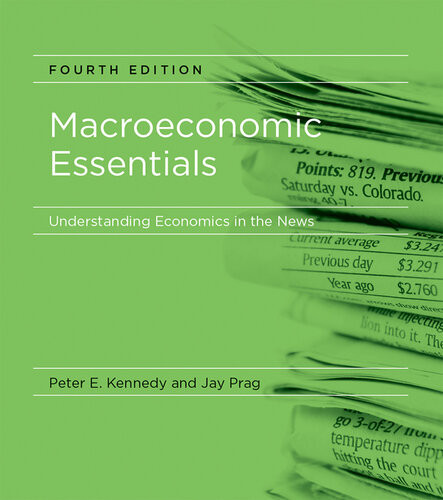

Most ebook files are in PDF format, so you can easily read them using various software such as Foxit Reader or directly on the Google Chrome browser.
Some ebook files are released by publishers in other formats such as .awz, .mobi, .epub, .fb2, etc. You may need to install specific software to read these formats on mobile/PC, such as Calibre.
Please read the tutorial at this link: https://ebookbell.com/faq
We offer FREE conversion to the popular formats you request; however, this may take some time. Therefore, right after payment, please email us, and we will try to provide the service as quickly as possible.
For some exceptional file formats or broken links (if any), please refrain from opening any disputes. Instead, email us first, and we will try to assist within a maximum of 6 hours.
EbookBell Team

4.7
76 reviewsThis introductory text offers an alternative to the encyclopedic, technically oriented approach taken by traditional textbooks on macroeconomic principles. Concise and nontechnical but rigorous, its goal is not to teach students to shift curves on diagrams but to help them understand fundamental macroeconomic concepts and their real-world applications. It accomplishes this by providing a clear exposition of introductory macroeconomic theory along with more than 700 one- or two-sentence “news clips,” based on economics media coverage, as illustrations or student exercises. Although the writing is accessible, end-of-chapter questions are challenging, requiring a thorough understanding of related macroeconomic concepts, critical-thinking skills, and an ability to make connections to the real world.
This fourth edition has been thoroughly revised and updated, with new material on such topics as aggregate supply and demand, supply-side models, recent issues faced by the Federal Reserve, the role of government, and “burst bubbles.” The more challenging end-of-chapter questions are separated out, and news clip questions have been added that refer to recent events. Optional chapter appendixes offer technical material; other appendixes provide answers to sample exam questions and to even-numbered end-of-chapter questions. Text boxes (“curiosities”) offer short expositions of related topics. The book can be used as a text for principles of macroeconomics and applied macroeconomics courses, as a supplementary text for a traditional macro-principles course, or for MBA macroeconomics courses.